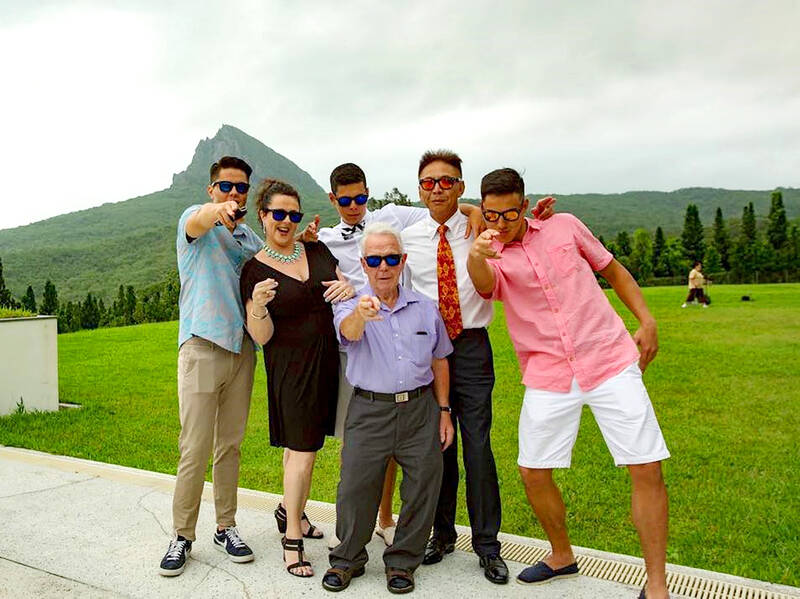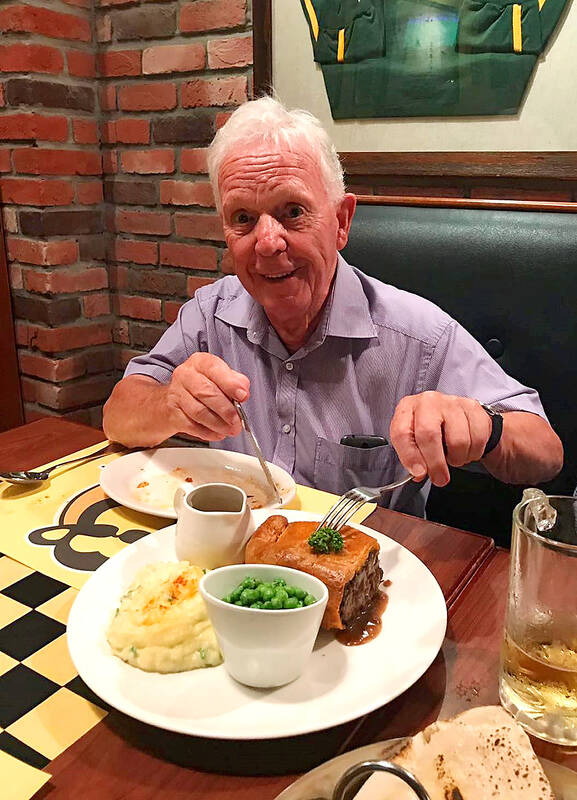Bert Salt spent the final 13 years of his life exactly where he wanted to be: In Taipei, near his daughter, his three grandsons, and a wide circle of friends. It’s just a shame, Bert’s daughter Elaine says, that her father never enjoyed the sense of security that formal residency status in Taiwan would have given him.
Bert and Elaine’s mother, Irene, had been frequent visitors to Taiwan since 1989, as part of their “sun chasing” lifestyle. After Elaine married a Taiwanese man in 1992, her parents’ visits lasted up to three months.
In 2007, when he was a 75-year-old widower, Bert made Taipei his home. Every three or six months, the Welshman flew overseas and either applied for a new visa or returned using the visa-free entry privilege accorded to Britons.

Photo courtesy of Elaine Salt
Between 2007 and his death on April 27, 2020, Bert spent at least 11 months out of every 12 in Taiwan, Elaine says. Many of the 50-plus “visa runs” he did consisted of flying to Hong Kong, grabbing a coffee at the airport there and then returning to Taiwan without passing through Hong Kong immigration.
One time, while exiting the country at Taoyuan International Airport, an 82-year-old Bert was informed that, because he’d overstayed his visa by a matter of hours, he wouldn’t be allowed back into Taiwan. Yet later that day he had no problems reentering the country. It seems there was a lag between Bert being flagged as an overstayer and his name appearing on the blacklist.
On his next visa run, however, he wasn’t so lucky. Immigration at Taoyuan refused him entry due to his previous overstay, and demanded that the airline he’d flown in with take him back to Hong Kong. It was nearly midnight, and Bert had neither his cellphone nor his credit card with him. When he was allowed to make a call to Elaine, he spoke Welsh so as to confound any officials listening in, and told her he’d exaggerate his heart ailment. He was taken to a hospital. Then, to their surprise, he was allowed to stay in Taiwan as if he hadn’t sullied his record.

Photo courtesy of Elaine Salt
Because of these close shaves, subsequent visa trips caused him considerable stress. “Each time he was due to make a visa run, he’d look ashen and feel unwell. His diverticulitis would flare up, because he was worried he wouldn’t be let back in,” Elaine recalls.
Even after Bert was diagnosed with a brain tumor at the age of 84, officials refused to make an exception and let him stay in the country on health grounds. Their lack of empathy dismayed Elaine. “Their attitude could be summed up as ‘You can’t vote, so whatever you say, we don’t care,’” she says.
As a result, regular visa runs were part of Bert’s life until October 2019. “That final time we went to Thailand. It was the only visa trip on which I had to accompany him, because he needed a wheelchair to walk long distances through the airports by then,” Elaine says.

Photo courtesy of Elaine Salt
Elaine says that her father’s illness didn’t cost Taiwanese taxpayers a single dollar. Because he wasn’t covered by the National Health Insurance system, the Salt family paid for all of Bert’s treatment, spending several million NT in total. Irene Salt, who suffered from multiple sclerosis, also paid large medical bills while in Taiwan, Elaine says.
Bert never worked during his stay in Taiwan. In fact, because he was spending money he’d earned elsewhere, his presence was undoubtedly an economic plus for the country, Elaine adds.
Elaine remains angry and frustrated at the rules that continue to prevent people like her father joining their adult children in Taiwan. She asks, why aren’t they allowed to be “xiaoshun [孝順, filial piety], like other Taiwanese?”

Photo courtesy of Elaine Salt
The family considered various workarounds.
“We looked into setting up a company so he could be hired as a manager. But with no professional licenses, no educational certificates and no employment record — because he always worked for himself — it proved impossible,” says Elaine.
Bert also had opportunities to marry Taiwan citizens in order to obtain residency, but he turned them down.
“I know people who’ve fudged the investment rules or arranged a marriage, simply so a parent could stay here, but that wasn’t something my Dad was prepared to do,” Elaine says.
Because many adult children will do whatever it takes to make their aged parents comfortable and happy, the government’s failure to provide a path to residency for people like Bert Salt, “almost forces us to not abide by the law,” says Elaine.
“Taiwan can do better, and should do better,” she says.

On April 26, The Lancet published a letter from two doctors at Taichung-based China Medical University Hospital (CMUH) warning that “Taiwan’s Health Care System is on the Brink of Collapse.” The authors said that “Years of policy inaction and mismanagement of resources have led to the National Health Insurance system operating under unsustainable conditions.” The pushback was immediate. Errors in the paper were quickly identified and publicized, to discredit the authors (the hospital apologized). CNA reported that CMUH said the letter described Taiwan in 2021 as having 62 nurses per 10,000 people, when the correct number was 78 nurses per 10,000

As we live longer, our risk of cognitive impairment is increasing. How can we delay the onset of symptoms? Do we have to give up every indulgence or can small changes make a difference? We asked neurologists for tips on how to keep our brains healthy for life. TAKE CARE OF YOUR HEALTH “All of the sensible things that apply to bodily health apply to brain health,” says Suzanne O’Sullivan, a consultant in neurology at the National Hospital for Neurology and Neurosurgery in London, and the author of The Age of Diagnosis. “When you’re 20, you can get away with absolute

May 5 to May 11 What started out as friction between Taiwanese students at Taichung First High School and a Japanese head cook escalated dramatically over the first two weeks of May 1927. It began on April 30 when the cook’s wife knew that lotus starch used in that night’s dinner had rat feces in it, but failed to inform staff until the meal was already prepared. The students believed that her silence was intentional, and filed a complaint. The school’s Japanese administrators sided with the cook’s family, dismissing the students as troublemakers and clamping down on their freedoms — with

As Donald Trump’s executive order in March led to the shuttering of Voice of America (VOA) — the global broadcaster whose roots date back to the fight against Nazi propaganda — he quickly attracted support from figures not used to aligning themselves with any US administration. Trump had ordered the US Agency for Global Media, the federal agency that funds VOA and other groups promoting independent journalism overseas, to be “eliminated to the maximum extent consistent with applicable law.” The decision suddenly halted programming in 49 languages to more than 425 million people. In Moscow, Margarita Simonyan, the hardline editor-in-chief of the